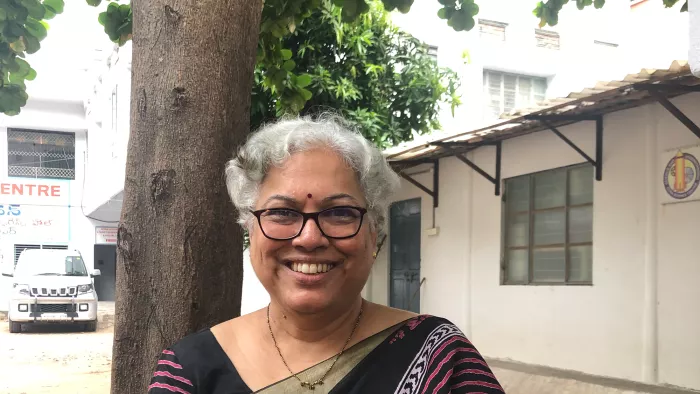
Special mention: Impactful leader
Dr Keerthi Bollineni, Vasavya Mahila Mandali / Mahila Mitra
You received a Special Mention in the category of Impactful Leader. Can you tell us more about your work in this area?
I hail from a Gandhian family and my grandparents are freedom fighters and social reformers. But that has not stopped me experiencing violence. I am a survivor of domestic violence and faced abuse and shame as widow – but I realised it is not only me. About 70 to 80% of women in India face abuse or violence from men, and domestic violence is a normally acceptable scenario.
What challenges have you faced? Have there been any solutions that worked particularly well?
My personal experiences, and those of women I counsel, made me realise that women in crisis face two major challenges: the attitudes, mindsets and behaviours of patriarchy, and the lack of support from family members. I am fortunate to have such a supportive family myself.
So, I thought that women need the confidence to face these life situations. They need a community where they feel trusted, that will hear them and support them. So in January 2017, I started Mahila Mitra, a social initiative to trigger a change in the attitudes and behaviours of patriarchy. Through this initiative, women are supporting one another in crisis as sisters, and educating other women and girls on their rights.
We started by training Vijayawada city police to become gender sensitive when dealing with women approaching them in crisis. We trained 3,500 police in Vijayawada in 2017 and are now training 7,0000 cops in the state. This attitudinal change is giving women who face abuse or violence the confidence to approach Mahila Mitra members or police stations for redressal.
Where do you see your work going next?
I realised through my work at local level that community is essential for every woman, so in 2021 I am starting the “Global community of women survivors of domestic violence”. The purpose is to create a community from all over the world, at local and regional level.
Through this global community, lapses in policy or implementation will be taken up through Vasavya Mahila Mandali in coordination with other civil society and UN bodies.
Why is this work so important to you?
My mission is for every woman to live with dignity and respect: #NoSilenceForViolence.
Networking, collaboration and sharing their stories with others make women survivors stronger to work for other women. So I am one of the changemakers under the Change.org Foundation’s She Creates Change programme, and as a FEMTalk speaker I spoke in September 2020 at the UN Women USA LA Chapter.
What changes to the humanitarian sector are needed in the next 10 years? What are the main obstacles to achieving this?
The humanitarian sector should recognise that human rights are women’s rights. Building values and morals is essential: the sector should not only deliver direct services but also work towards changing attitudes and behaviours among service providers and stakeholders.
Corporates working in the humanitarian sector have a social responsibility to support work on the safety and protection of women and girls, to encourage networking and collaboration and to share best practice in this area.
Train women and youth to become efficient and committed leaders, bringing change through non-violent means.
As usage of virtual spaces increases, digital safety and cyber safety to must be at the forefront – especially protecting women and girls from cyber abuse.
2020 has presented multiple challenges globally. What are the key lessons for the humanitarian sector this year?
I think out of the box, taking each challenge as an opportunity to grow or to work differently.
The key lessons from 2020 are around the move from physical spaces to virtual spaces. Using apps to get information is now accepted. For example, hospitals are closed but teleconsultation for medical services is available. And I never imagined women would go so fast in becoming tech users.
This means that investing in virtual spaces is the need of the hour – things like broadband width, internet speed, accessibility. Children are now learning online, but 68% of children in India do not have the resources to access online education. Women have started attending online meetings but one challenge is that men in their families question whether women really require the internet. So attitude change is needed.
COVID-19 has affected both rich and poor, but those who have proper financial planning are able to manage the crisis. Where business is affected, vulnerable people (such as street vendors or migrants) became much more vulnerable.
Why do you think that in an era when we have more access and communications, crises have increased in numbers and gravity?
Preparedness is lacking in many countries. They thought “It won’t come to my country.”
This leads to problems if consequences are not taken seriously at the beginning – for example, technology is not properly implemented, or not implemented at the right time.
Countries are not learning from each other or networking across borders. In some cases, they are blaming one another. Nobody had seen this level of seriousness in a health pandemic, so countries were starting from scratch, without the necessary resources, knowledge or skills.
Why is important to transform the sector and if there is one thing that you would encourage your fellow humanitarians to do, what would it be?
Each person’s life is valuable, so invest in people-centric interventions that are very practicable and localised. From the 2020 crisis, discuss what worked and what did not. A spirit of ownership is essential for maximising social justice, especially keeping the most vulnerable (women and other marginalised people) at the forefront to receive AND deliver services. Invest in building digital community change leaders.
